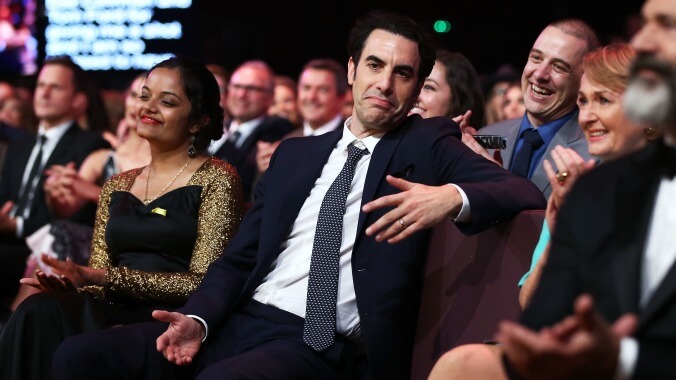Sacha Baron Cohen blames Twitter for getting Trump elected, and yeah, duh

Sacha Baron Cohen is a man who always has something to say about something, even if he usually does it under pounds of prosthetics and a phony accent, but now he’s using his real face (as far as we can tell) to drop a hot take that is actually pretty lukewarm. Speaking with Don Cheadle as part of Variety’s Actors On Actors series, Baron Cohen explained that he thinks we can pin a lot of the blame for Donald Trump winning the presidency on Twitter, and the reason CEO Jack Dorsey has failed to do much about Trump’s emboldening of “white supremacists and racists” on the platform is that he doesn’t want to upset the guy who is “actually the biggest celebrity endorser of his company.” (Try not to hurt yourself while picking your jaw off the floor.)
So yeah, it’s not exactly a controversial statement to say that Twitter helped spread Trump’s message to more people than a few racist TV ads would’ve, and Twitter has a long history of refusing to do anything about its worst users (though that trend has shifted a bit in the past). Also, Twitter has said on multiple occasions that it will not ever ban Donald Trump, either because his Tweets have a level of “newsworthiness” or specifically because he is a world leader. Of course, just because it should be obvious to us by now that Twitter is bad and that the people who run Twitter are bad doesn’t mean it’s not worth saying, and Baron Cohen does make some other points in his chat with Cheadle.
For instance, Baron Cohen says that he believes we’re at a “dangerous” point in society because “democracy is being disintegrated.” He notes that a lot of people grew up with “the idea that society is getting better,” where “people are equal despite their differences,” but now it seems like that’s no longer the case. He says that’s one of the reasons he made Who Is America?, because he wanted to push the people he interviewed right the edge “where just before a punch or a gun is pulled out.” Baron Cohen says that’s where “people’s real thoughts are and real beliefs are,” and he wanted to get people to say and do things that “you’ve never seen on television before.”